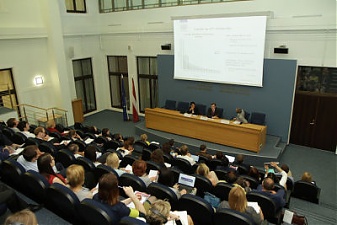Baltic Export, EU – Baltic States, Latvia, Legislation, Markets and Companies, USA
International Internet Magazine. Baltic States news & analytics
Thursday, 25.04.2024, 14:03
Discussion on TTIP: lifting of non-tariff barriers to simplify EU food exports to U.S.
 Print version
Print version |
|---|
The Latvian Foreign Ministry hosted the discussion on May 25 to provide Latvian audiences with an opportunity for talking directly to TTIP experts from the European Commission, the ministry said.
Brian Kilgallen, TTIP Negotiator on Sanitary and Phytosanitary Measures (SPS) at DG Health and Food Safety of the European Commission, asserted in his presentation that the retaining of the EU's high standards in food safety and the plant and animal health is one of the main prerequisites to garner support for the agreement in the member states and among the general public. Besides, in the food sector, there are high customs tariffs on a number of groups of goods, and the reduction of those tariffs would soon yield benefits, for instance, in the exports of confectionery, cheese and meat products. The expert also noted that many non-tariff barriers still exist in the sanitary and phytosanitary sectors, the removal and reduction of which, without relaxing quality requirements, would simplify exports to the USA for the EU's food producers.
The meeting addressed benefits from the TTIP, potential challenges and the state of affairs in TTIP negotiations. A special focus was placed on the issues of major importance for Latvia, such as support for small and medium companies to enable their involvement in transatlantic trade, food safety and quality, and the standards of environmental and health protection.
Martins Kreitus, Director of the Foreign Trade and Foreign Economic Relations Promotion Department at the Foreign Ministry, outlined the importance of the TTIP for Latvia and emphasized that, in the TTIP agreement, economic and geopolitical considerations are of equal importance. The TTIP agreement contains the most up-to-date provisions for support of small and medium-sized businesses in international trade, which is of particular importance for Latvia, since SMEs comprise 90% of all Latvian exporters to the United States.
Renita Bhaskar, a representative from DG Trade of the European Commission, outlined the state of affairs in TTIP negotiations and noted that it should be possible to resolve the main issues by the end of the year. It was also emphasized that the signing of the TTIP between the world's largest economies – the EU and the USA – will also help establish global trade standards that meet present-day economic needs.
Special attention was also devoted
to the transparency of negotiation, and opportunities were presented to obtain
information on the progress and the EU's interests in TTIP talks, and the
accessibility of the TTIP documents to the public, including members of
national parliaments.
This was one of the regular events held by the Foreign Ministry in public communication involving business associations and the non-governmental sector to highlight the importance of the TTIP agreement and its benefits for economy and people in general.
The discussion brought together more than 50 participants including members of the Saeima, social partners, representatives from business associations, companies, ministries and foreign embassies, and other interested parties.








 «The Baltic Course» Is Sold and Stays in Business!
«The Baltic Course» Is Sold and Stays in Business!

